A chat with Snowy the Great
At her best, Emma Snowsill was the greatest Olympic distance women's triathlete of all time. She has a women’s best-ever three International Triathlon Union world championship titles (2003, 2005, and 2006) – plus a single day ITU Grand Final win (2010) in the new era which awards the world championship for performance over an entire season. She won the gold medal at the 2006 Commonwealth Games and the 2008 Olympic Games Triathlon in Beijing. She won the big money triathlons four times — two at Life Time Fitness (2005 and 2006) and two at Hy-Vee (2008 and 2010).
While she dominated more big races than any of her rivals before or after, the woman her friends call Snowy would hardly have been cast in a movie about a dominating sports figure. The Mighty Mite stood 5-feet 3-inches tall [5-2 in one profile] and was listed as 108 pounds. In keeping with her slight stature, she proved to be fragile in between those big days. She suffered a broken femur early in her pro career had an operation for a labral tear in her hip in 2009. But her biggest battle, the one that ultimately forced her early retirement at age 33, was a series of attacks on her immune system that left the all-conquering powerhouse weak, flat on her back and humbled for the much of the last five years.
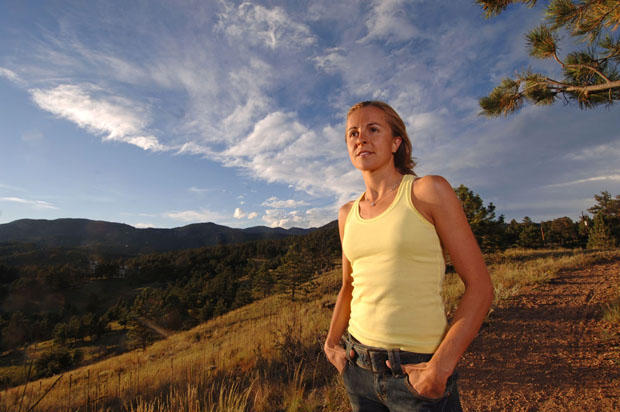
Slowtwitch: What kind of a kid were you – just a bit younger than today?
Emma Snowsill: LAUGHS I feel bad when you are made to feel old when you are retired. I am certainly not an age when you feel that word is rightly associated. My earliest recollections were playing in the pool and playing in the back yard with all our friends. We lived on a cul de sac in an area called Benowa on the Gold Coast. We typically had so many kids on our street that we would go from one pool to the other making up competitions. My sister Amy and I couldn’t sit still for long. Mum and dad would attest to that.
ST: Any difficulties to overcome?
Emma: Growing up in Australia, we have surf lifesaving courses and activities at a very young age. I went to one as a young girl and was taken out – not by my parents – into some really rough surf. I had a really bad experience getting thumped around and I feared getting back into the ocean for quite a while. My dad worked very hard encouraging me to learn about the ocean so I wouldn’t fear it later in life.
ST: Any illnesses or injuries?
Emma: When I was in high school I was quite serious about swimming and I burned the candle at both ends. My final year I probably had an average of 5 hours of sleep while training twice a day and taking school exams. I got what Americans call mononucleosis and struggled with it for a few years.
ST: Where did you get your fierce will to win?
Emma: People ask if there was anyone in our family who was particularly sporty or driven like that. No one was very sporty. But mum and dad and both sides of the family had a hard work ethic. As I got older, I see that was something my sister and I were absorbing.
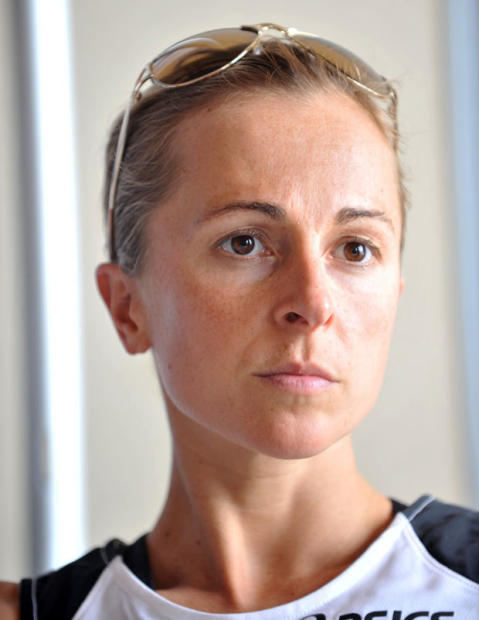
ST: What sorts of sports and activities did you did you try?
Emma: My dad encouraged us to do many things. We played tennis, basketball and the piano. Amy and I were given an opportunity to try whatever we liked until we found something to stick with – which was swimming. We swam a lot considering our ages, but it was always our choice.
ST: What did you dream of becoming?
Emma: I remember sitting on the couch as a young girl and watching the Olympics on TV. I was mesmerized and thought, 'One day I want to compete for my country in swimming!'
ST: Did you have any sports heroes?
Emma: I met Susie O’Neill at a breakfast in my final year at high school. I still have the photo. I remember watching her swimming in three Olympics [8 medals, 2 gold]. She was certainly my hero.
ST: When did triathlon come to your attention?
Emma: I remember running cross country in school. [2000 ITU World Champion] Nicole Hackett won my age group and I came in 11th or something. The run coach said, ‘That girl does triathlon.’ I thought, ‘What is that all about?’
In 1996 a friend asked me to swim the 1500 meters in a relay at the Noosa Triathlon. I said, ‘I can do that.’ I came with my mum and dad and I was just blown away. I thought, 'This is just the coolest thing I've ever seen. This is far more interesting than sitting by a pool for a week and competing in a few events.'
ST: Luke Harrop was your boyfriend. He was handsome and full of life. Tell us about him.
Emma: We met in March of 2000 at a World Cup. Like you said, he was very charismatic. He had a huge love of life, and adored his sister Loretta.
ST: He was a devoted brother.
Emma: He was trying to emulate his sister’s footsteps [She won the 1999 ITU World Championship and he was a fast improving professional].
ST: What drew you to him?
Emma: He had an energy that a lot of people found contagious. He was a great example why I was drawn to the sport.
ST: In March of 2002, Luke was on a training ride when he was hit by a woman driving a stolen car who fled the scene. He died a day later. That must have been devastating.
Emma: I was still really young, only 20. It was difficult to come to terms with his death because on one hand Luke was kind and caring and represented all these good things about life. The lady who took his life was the polar opposite. I found it hard to understand how a person who represented everything we would consider negative had taken the life of someone so positive. This really preyed on me and affected me deep down for a long time. I felt like I’d lost my rose-tinted glasses on life.
ST: The nation mourned his death.
Emma: It was a huge shock to the triathlon community worldwide.
ST: Were you close with Loretta before Luke died?
Emma: I hadn't had a lot to do with Loretta. But from that point on, the strength she showed to take me under her wing and offer so much support was amazing.
ST: How long were you grieving?
Emma: I wanted to turn away from triathlon because it was causing me so much pain. For a good two months I didn't want to have anything to do with the sport. I considered never touching it again.
ST: How did you come out of it?
Emma: Loretta was instrumental in turning that mindset around for me. She encouraged me to get back into triathlon to celebrate and honor Luke's life. She reminded me that he would not have wanted us to throw away what he loved so much.
ST: When did you take the first steps back?
Emma: That time is still quite a blur. Loretta went back sooner than I did, probably six to eight weeks after the accident. In the beginning it was certainly uncomfortable for me.
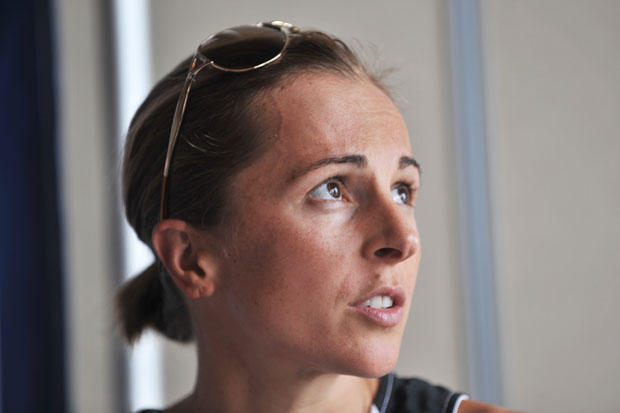
ST: How did you get back to training?
Emma: When Loretta decided to make the commitment to continue racing, she asked [coach] Brett [Sutton] if she could bring me into the squad. Loretta had a good relationship with him and he agreed. If the circumstances were different, I don't think Brett would have said yes.
ST: Why not? You won the 16-20 age group at the 2000 ITU World Championship.
Emma: Brett was coaching world champions and people making a living at the sport. Even though that was my dream, I don't think anyone at the time would have guessed that would be my future. I think Loretta felt it was beneficial to have me around. Really I was thrown into Brett's squad by chance.
ST: What was the hardest part of returning to training?
Emma: I was struggling living on the Gold Coast where I might go past the scene of the accident on a daily basis. Getting on the bike was the last thing. I didn't ride on the road in Australia for at least a year and a half. Everybody thought it would be good if I distanced myself from the place for a time. So when Brett’s squad moved to Switzerland that summer, Loretta and I went with them. I rode when we went to Europe because it was so quiet where we were and the drivers were a lot more respectful of cyclists.
ST: You placed 17th Junior Woman at the 2001 ITU World Championship. Did you compete at the 2002 ITU Worlds?
Emma: I got a stress fracture in my femur. My body was used to swimming. Taking on increased workloads in different weight-bearing sports and having a tenacious work ethic, your body gets to know its limits. Sometimes you don't discover them until it’s too late.
ST: You started racing many World Cups in 2003. How did you think you might do at your first elite ITU World Championship that December?
Emma: I won my first World Cup race at Makuhari two months before Queenstown. Loretta and I had a breakaway on the bike together and I ran off to the win. That totally shocked me. It was the first I’d beaten Loretta. I was thankful I had learned so much from her – and I also felt I shouldn't have beaten her.
ST: What was your strategy at Queenstown?
Emma: There was no strategy other than if I was in a good position coming into the run, I had to make sure there was no one left to beat in a sprint. That was my weakness. I raced a few World Cups earlier that season against Anja Dittmer and Lizzy Blatchford where I was comfortable running with them. But I didn't have another gear and I was losing in the sprints. So Brett changed it around for me. He said, 'You clearly can't sprint at the end of the race. We need to put the pressure on early. You just have to sprint out of transition and all you need to do then is get ahead and hold it.'
ST: How did the race go?
Emma: I finished a little bit behind top swimmers like Sheila Taormina and Barb Lindquist. I remember working really hard close the gap as soon as we got on the bike because I had to be with them if there was a chance of a breakaway to get rid of the stronger runners, particularly Michellie Jones. I started the run about 8th.
ST: What was it like to pass seven highly decorated contenders?
Emma: I figured if I was running past them I better keep pushing. I was afraid they were going to come running back at me.
ST: How did it feel to win a World Championship?’
Emma: I remember coming down the finish chute and people handed me the Australian flag. I didn’t know how to celebrate. I wasn't sure I had done the whole course. I felt very inexperienced and completely surprised.
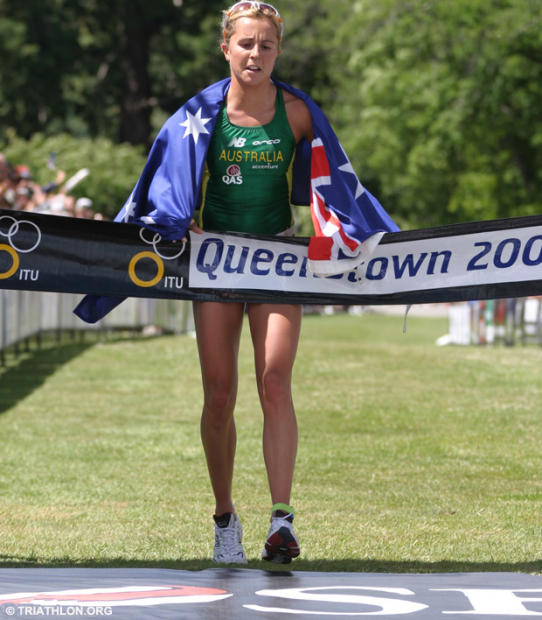
ST: You had another life lesson with 2004 Olympic qualifying, when you didn't make the team.
Emma: After Queenstown, I developed a stress fracture in my femur. The thing was, Brett was not peaking me to race for Olympic selection.
ST: Why not?
Emma:Even before the injury, he didn't see me as an Athens contender. He said, 'You'll be ready for Beijing.’ After Queenstown I recovered enough that he let me race the qualifiers, but my body had reached its threshold. Clearly I'd gone over the edge and should have taken a break.
ST: Did you feel robbed? Loretta Harrop and Rina Hill were awarded the first two spots. But selectors picked young Maxine Seear over you and Michellie Jones.
Emma: I truly did not feel I should have been selected. I raced well, but I shouldn’t have been ahead of Michellie. We were told that some people can and some people can't cope with Olympic pressure. Michellie always performed at her best in the biggest races. To me it was baffling that Triathlon Australia wasn't utilizing their greatest competitor after Loretta.
ST: What was your most hard-earned World Championship win?
Emma: The most hard-earned was the 2006 ITU World Championship in Lausanne. I thought 2003 was a shock – I didn't expect it and I thought it might be a fluke. In 2005, the weather in Gamagori was hot [95 degrees Fahrenheit, 90 percent humidity] and I do well in the heat. In 2006, Vanessa [Fernandes] was winning many World Cups. Because we met one another so rarely Lausanne was a highly anticipated showdown.
ST: What did Lausanne mean to you?
Emma: That year, I was trying to see if what I was doing was working without Brett, who quit coaching – me included – for a while after the 2004 Olympics.
ST: How did the race go?
Emma: The bike course was very hilly and I focused on keeping in a good position on the bike. When no one broke away, Vanessa and I came into T2 in a large group. Vanessa had a faster transition and I was a bit behind.
ST: What were you thinking as you started the run?
Emma: Whoever it is – Vanessa or anyone else – I shut them all out and it becomes just about me and the pavement. I told myself, 'There is nothing to lose. You are in a world championship. Go for it.' I came up on her mid-run and we ran together for a bit. I knew I couldn't leave it to the sprint, so I had to make my move earlier. When I made the break, the adrenaline took over. [Snowsill ran 33:35 – 49 seconds faster than Fernandes – and won the race by 46 seconds.]
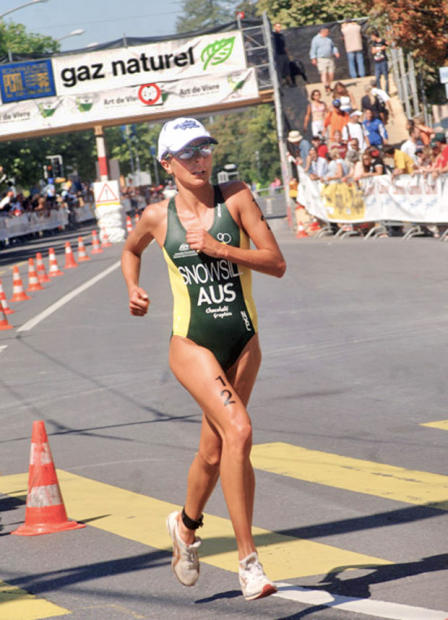
ST: Before the Beijing Olympics, many thought that your boyfriend Craig Walton was coaching you.
Emma: The first thing we need to clarify is that Craig never coached me. I can see people thought he did, but this is quite a large misconception. When Brett quit coaching at the end of 2004, I wrote down everything I learned from him and about the training I was doing. Then I went to one of Australia's best swim coaches – Dennis Cotterell – who worked with [Australian Olympian] Grant Hackett. I had worked with Dennis. He became my sounding board and my mentor as I organized my own training program and did some of my swimming with Dennis.
ST: What was Craig's contribution?
Emma: Craig had trained with Brett and Brett's bike training was typically low-cadence, bigger gear stuff. With the Beijing course featuring many corners and fast changes of pace, Craig suggested that I try motor pacing to build strength. When Craig retired in March 2008, it was 5 months before the Olympics. Rather than getting a full time job right away, he asked if it would be beneficial if he could help doing things that would allow me to devote all my energy to my training. Craig was also a sounding board to discuss my training. But I was very strong-headed. I typically asked a lot of questions but I always ended up doing what I wanted. If I made a mistake I wanted all the blame. Craig was no doubt part of that Olympic experience. But in the sense of coaching me – he never told me what to do.
ST: You beat Vanessa in at Lausanne in 2006 when she was on a 12-World Cup win streak. But she came into the 2008 Olympics stronger than ever. She won the 2007 Olympic preview World Cup in Beijing and you were second.
Emma: There was no doubt she was absolutely on form.
ST: Did your training for Beijing go smoothly?
Emma: I put so much pressure on myself that, with a couple weeks to go, I had really overdone it. Dennis Cotterell saved me. I was in the pool and I was just going nowhere. He knew all the work I'd been putting in and he could tell where I stood. He said, 'You need to get out and rest for two days.' I couldn't fathom that because I had planned the last three weeks before the race — when I had to travel, what time and what sessions I had to do and what I wanted to accomplish in these sessions. It was really hard to abandon my plan, but he just said, 'If you don't rest now, you won't be racing in three weeks’ time.' I learned that backing off was crucial when your body was worn down.
ST: At the Olympics, you were with front group on the swim and the bike. The race really began on the run.
Emma: It was quite warm and people were taking in water straight away. Once again I needed to put pressure on early because I didn't want to be running 8 or 9 kilometers with someone by my side. I didn't fancy my chances leaving it to those last 200 meters.
ST: When did you leave Vanessa behind?
Emma: In the first couple hundred meters.
ST: You kept track of her?
Emma: Absolutely. That run course was out and back and I could see people chasing me at each turnaround. I was encouraged because I was putting time into Vanessa.
ST: When did you know you'd won?
Emma: Throughout the race, I was thinking about what happened to Loretta in Athens [where Kate Allen passed her with 200 meters to go to take Olympic gold] and it really preyed on my mind. On every out and back I was counting my lead. I wanted to make sure someone I hadn't caught a glimpse of wasn't charging through the field. It seemed like that final straight went on forever. I thought if I stopped and absorbed what was going on, I'd become paralyzed with the emotion. I wouldn’t let myself believe it was real until I crossed the line.
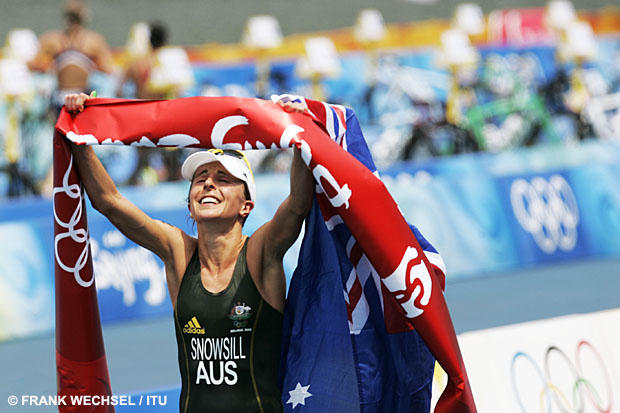
ST: How did you celebrate? Was there a letdown?
Emma: Moffy [Emma Moffatt] and I and a couple of triathletes enjoyed the athletes’ village and the closing ceremony. I caught a cold two days after the race. I realized the body knows, 'OK, I can hold up for this certain time. I'll keep you together and I'll keep you in one piece.' Then it says, 'OK we've done it. Good.' That’s when your body lets its guard down.
ST: What did you think of the men's race?
Emma: There was a battle between Simon [Whitfield] and Bevan [Docherty] and Javi [Gomez] and this German guy [Jan Frodeno]. I thought, 'He is so tall!' He was making all of them real nervous – for good reason.
ST: When did you get acquainted?
Emma: I met Jan back in Richards Bay in 2006 at the first World Cup in South Africa. [Snowsill won, Frodeno was 3rd] Jan often trained in South Africa and the South Africans were half claiming him as their own. I remember this chatty guy with all the media. I was thinking, 'Who is this upstart? I haven't heard of you before?'
ST: When did you find out?
Emma: I didn't really have an opportunity for a proper conversation with Jan until spring of 2010. I had never been one to talk a lot. But we had an immediate connection. I could talk to him about anything and everything – particularly things outside triathlon. I was really interested in him but I thought, 'Well, he lives on the other side of the world. That's never going to work.' I went back to Europe that summer and I found myself wanting to spend time with him. And it just evolved.
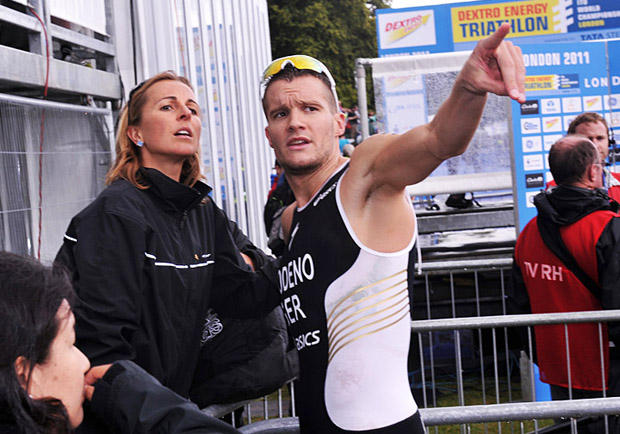
ST: Did you have setbacks after the Olympics and before your wins at Hy-Vee and Budapest in 2010?
Emma: I hadn't had any injuries since the end of 2009 when I had a labral tear on my hip and had an operation. But my problems from there on were related to my immune system. It started with a virus I picked up at Lizzy Blatchford's October 2009 wedding in Bali. I got cytomegalovirus, which has symptoms similar to mononucleosis – fatigue, fever and muscle aches.
ST: When did symptoms hit?
Emma: I got sick the last couple of days I was in Bali. A few weeks later I wasn't getting better. I had a cold and a sore throat that didn't go away for five months. I was bedridden, sleeping 11 hours a night and three hours during the day. I wasn't able to do anything physically. My immune system had picked up something and for quite a while no one knew what it was. Doctors thought it might be dengue fever or Lyme disease. When it was diagnosed, there weren’t any treatments other than rest. As soon as I got this glimmer of hope, I returned to training but my system remained weak. I put myself on the start line for Seoul in April of 2010. [Snowsill finished 6th and Frodeno won] Half the field got really ill after that race from the water and it hit me 24 hours later. My system was already so compromised I had a parasite in my gut for the next 2 and half years that continued to attack my immune system.
ST: You recovered enough to win Hy-Vee and the Budapest Grand Final later that year and placed 3rd at Hamburg and 5th at London in 2011. But you were battling illness?
Emma: I wanted to make the Olympics but I was fighting an uphill battle. In hindsight I should have taken time off to recover. I found I could get fit for small periods of time, then I would just get run down and sick again. I felt like someone had pulled out my electrical cord.
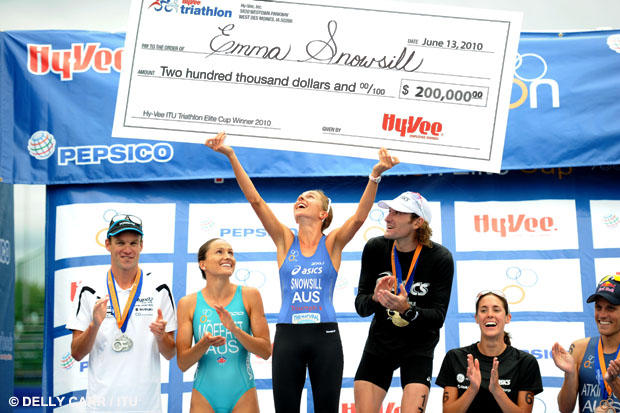
ST: The doctors couldn't figure it?
Emma: The doctors asked, 'What have you been eating? You have no protein in your blood. You've got no vitamins and minerals. You've actually got a very low blood cell count – never mind white blood cells.’ They were quite concerned and had no answer. The body can take just so much stress. Unfortunately I kept thinking, 'Oh I can push through and I will get over it.'
ST: Did anyone realize the state you were in?
Emma: If someone said to me, 'It will take you two months of complete rest and you will recover,' I would have said 'OK! Perfect!' It would have saved me 3 or 4 years of debilitating illness. When Dennis Cotterell saw me at a swim workout, I said, 'I am going to swim 1500 meters. I don't care how long it takes me. I am going to do it.' It took me about 40 minutes with flippers on and I wasn't getting better.
ST: What did you learn watching Craig Walton go through a similar immune system shutdown in 2006?
Emma: I knew you had to listen to your body and I was always really good at it during my career. But leading up to the 2012 Olympics I got carried away thinking I was invincible. I learned that is not the case – I am just like everybody else.
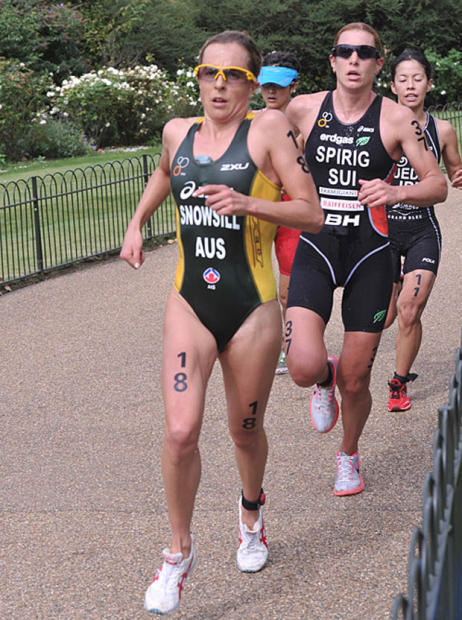
ST: After you lost your bid to make the team, what did you do?
Emma: The first thing I needed to do after not making the Olympics was accept that that dream was not mine. It was hard to come to terms with the fact that I was not going to race at London.
ST: You've always been stoic. But when you were alone did you cry?
Emma: Absolutely. I would say in the last 3 years, I probably cried more than I have in my whole life.
ST: What did this teach you?
Emma: Your emotions … SHE PAUSES
ST: I'm sorry.
Emma: No, that's all right. I think it's important to let yourself express your emotions. I think I've been really, really good at being hard on myself and getting the most out of myself. That's not a bad thing. But I also had to learn when to step back and not be so hard on myself. I started processing the things I wasn't achieving in the sport as failure. I had been thinking that my life as a triathlete and this world of triathlon was all that mattered. I was consumed by this failure. When I went to London not as an athlete, I had to find a role for myself in order to have Jan enjoy the experience as much as he could – even though he was struggling too (Frodeno finished 6th at London). So I did some commentary for Australian television.

After trying to regain her health and competitive fitness, Snowsill retired. On July 11 this year, she released a heartfelt statement:
I feel the time had come where I have made peace with where I've been and now where I am going. There has at times been a more public, professional persona with my life in triathlon, though now I feel more of an urge to share somewhat more of me. I have learned a lot throughout my career in regards to my own health exploration – not only reaching the very peak of physical health & fitness, but also to the bottom of the barrel where I have felt the furthest from optimum health and wellness. I have always had an overwhelming feeling that in some point in my life I am going to help others – maybe this is the beginning. What I do know is that I have goals, dreams and aspirations for other things in life which I am about to explore.
ST: What was the hardest thing about it?
Emma: It can get really bad when you have spent your whole life as an athlete and that was your identity. At times you stop and think, 'Oh no. I am not a professional athlete now.' You have to come to peace with that. The challenge was taking out the part of me that was wishing I was racing. I had to approach things in a different way. I want to help people understand what these athletes are doing and I want to educate people about this sport and help promote it partly through announcing.
ST: You worked at the Olympics and Commonwealth Games. What are some other races where you’ve done commentary?
Emma: I’ve done some post-production commentary and co-hosting for races here for Australia TV – Noosa, Mooloolaba, Geelong and Perth. I’ve given expert comments and sports news reporting for a major Australian network as well.
ST: What is the biggest difference between being an athlete and talking about it?
Emma: There is no black and white information to let you know how well you are doing. That's why I loved racing. I loved results. I want to know where I stand. And now I see in other parts of life it is normal not to have clearly defined results. My whole life had been precisely measured – win or lose. Whereas now there are large grey areas. To be honest, I am flattered and I thrive off the positive comments I get for my commentary. But no numbers.
ST: How are you taking these lessons into your future?
Emma: I have learned a lot since getting sick. Now I am studying how these things are connected in mind and body. Also, with Jackie [Fairweather] dying, I feel there is so much mind-body stuff going on that needs to be explained and connected in our lives whether you are an athlete or a normal everyday person. When I was so sick I obviously didn't feel like a normal person let alone an athlete. I had to ask myself how much further did I have to go down this road before I let go? How much more stress does my body need before I catch something really serious?
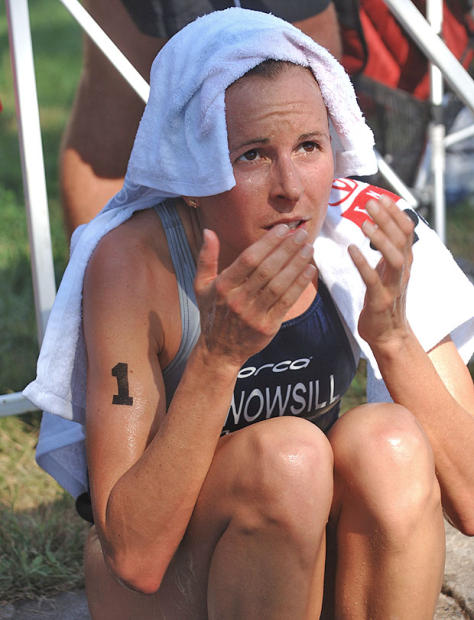
ST: Are you studying these issues with any educational or sports medicine institution?
Emma: I’m studying at the Institute of Integrative Nutrition of New York. It’s an holistic program where you’re given a lot of freedom to find niches that appeal to you. I’m really enjoying such a broad array of information.
ST: Is this an attempt to understand some of your own issues – and how you might advise young athletes?
Emma: It’s a course that really resonated with me. I feel like I have investigated what food to put in my body, how to listen to and get the best out of my mind & body. I’ve always sought answers to try to understand where I made mistakes, why I got injured and how to prevent it in the future. I realize now I got really good at doing these things. I can see how much of that insight is needed by not only young athletes, but many professionals and everyday people. Ultimately everyone is a work in progress. Sometimes this also means looking at what we hold in our minds. This can be negative self talk, memories or experiences that have affected us. Seeing how this can manifest in our bodies is something everyone can work on. Sport is an amazing tool that can teach us to live in the moment and use the power of our mind to focus on something as simple as our body and breathing. When I found myself really sick, I realize in hindsight that I expected this positive mindset to be there every day and self-automated. Yet it wasn’t there when I most needed it and I can see how toxic that can be. I believe a healthy body needs a healthy mind and a healthy mind is necessary for a healthy body.
ST: What sort of shape are you in?
Emma: I feel I have just turned a really big corner. I feel my constitution is stronger and that I can actually go out and exercise without it taking me back to bed for the rest of the day. It’s been over 5 years since I’ve had any inkling of feeling like my old self.
ST: Do you anticipate running, biking and swimming for fun and health?
Emma: Yes, I love running. The freedom and exploration of just throwing your shoes on and getting out the door is hard to beat. I haven’t been in the pool much as the chlorine was making me feel sick, so I prefer ocean swims. I love the road riding when we are in Spain and the mountain biking when we are back here in Noosa, so I still get my doses of triathlon. I also do some light gym work, and I'm going to get my Pilates certification as it has always been extremely beneficial to me.
ST: Now that you have retired as a competitor, how do you strike a balance in your life with Jan?
Emma: I understand what he goes through. The fatigue from training. The hunger. The travel. But in the same breath he is so encouraging of me venturing beyond Emma the Triathlete. It’s been a huge part of my life and after my competitive career I want to be involved in the sport as an announcer. But it’s important that Jan and I talk about life inside the sport and talk about life outside it with equal interest.
ST: Might you be coaching?
Emma: More health and wellness coaching than specific triathlon coaching. I believe the specifics of triathlon can become a whole lot easier when we have a stronger, healthier body and mind.
ST: Have you stopped to consider just how great your triathlon career was?
Emma: Sometimes I think that has been my blessing and my curse. I haven’t celebrated my success along the way as I’ve achieved my goals, but it also pushed me in my training to see how I can get the most out of myself. I’ve come to think that my career has just given me a louder voice and a bigger platform to be able to help people. I guess I better get shouting;-)
ST: Is there any comfort in that?
Emma: Yes, I’m proud of what I have achieved in my triathlon career, but I think the one thing that has remained constant through my success and now working through some of my lower moments is that I am still Emma – in and away from triathlon.
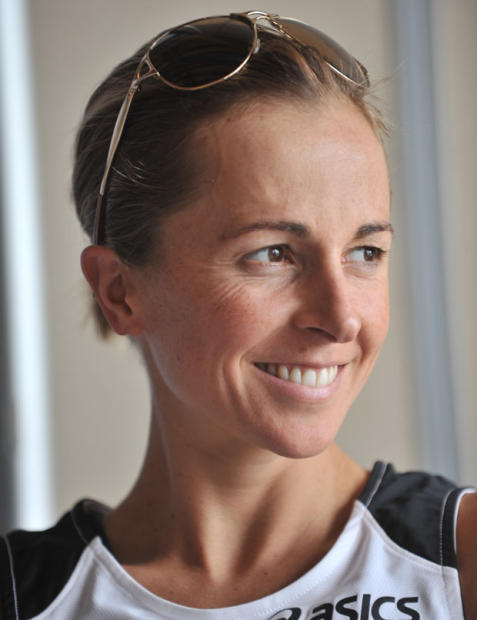



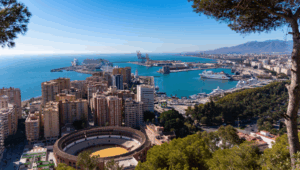
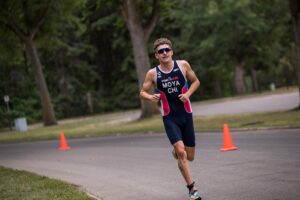


Start the discussion at forum.slowtwitch.com